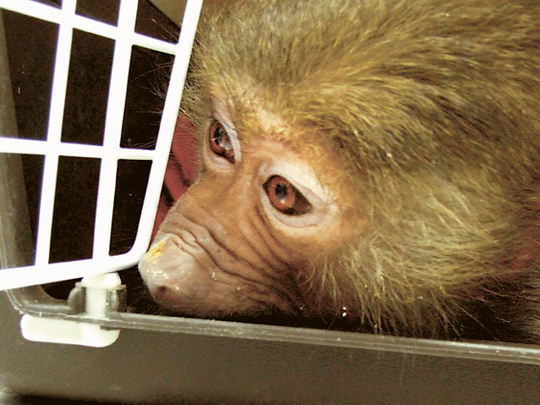
Baboons paralysed in bird cages. Siberian Husky puppies snatched away too early from their mothers. Parrots that have been neglected for so long they pluck out their feathers in distress. Animal cruelty is a widespread problem — and the battle against it persists.
The UAE's federal law curbs animal abuse and animal-lovers around the country work around the clock to stop its scourge.
But when our community reporter recently came across a baby baboon that was paralysed after being kept in a bird cage in a veterinarian's clinic at the Sharjah Animal Market, her story showed us only a glimpse of what goes on behind closed doors.
The reporter said the baboon was lying immobile in a cold, metal cage without any water or food. It tried to move but only succeeded in turning its head from side to side and managed a weak push with its rear legs. It had been in pain for a long time. Read the full story
Subsequently, animal-lovers Rashid Bin Hendi and Alina Lazarenko volunteered to go undercover at the Sharjah Animal Market, where the baboon was found.
There they encountered animals that were ill-treated, others that were neglected and still others that were not supposed to be in the country in the first place.
Sharjah Municipality's response
An official from Sharjah Municipality, who declined to be named, said that two veterinarians are stationed at the Sharjah Animal Market on two separate shifts.
He said: "It is the veterinarian's responsibility to carry out regular inspections of the market and make sure that the animals are not being mistreated, and that they are kept in hygienic conditions and spacious cages. If there is any suspicion that an animal may be ill, it is the veterinarian's duty to carry out health check-ups and check whether they are free from diseases or not."
The official explained that if the veterinarians notice anything out of the ordinary, such as exotic animals being sold, they are required to notify the Municipality immediately, who will then send inspectors over to the area.
"If there is anything happening against the law, the inspectors will carry out the necessary procedures required and follow up on the case," he said.
He added: "But up until now, we have never encountered any exotic animals that were being sold illegally in the animal market."
Restrictions
The caretakers of animals must take all necessary precautions to prevent cruelty. Those who conduct any of the following acts are considered cruel and punishable by law:
- To deny sufficient food, water and shelter for the animal.
- To beat the animal, causing it pain or harm.
- To practice any violent abuse, including sexual abuse.
- To subject animals used for riding, loading or drafting to excessive stress, irrespective of their power, age or health condition.
- To isolate, detain or transport the animalwithout giving sufficient food, water and ventilation or if the animal is unable to be moved due to ill health. Using unsuitable means or methods of animal care or husbandry. This includes mixing different animal species, transporting animals in unsuitable cages or through means that may injure them, and dragging them from their tails, legs or necks.
- Killing the animal in a merciless way or using slow means of death or causing them unreasonable or unjustifiable severe pain.
- Presenting, selling or trading in any injured, sick or physically unfit animals.
- Abandoning an animal or leaving it without care, for a long and unspecified period, unless the owner had an acceptable reason or was permitted by the competent authority.
Penalties
- Sexual abuse of animals: imprisonment lasting at least one month and a fine of at least Dh5,000.
- Deliberate release of infected animals: imprisonment with a maximum duration of one year and a fine of at least Dh5,000 or one of the two penalties.
- Violating other regulations can warrant a fine of maximum Dh20,000.
Source: Ministerial Decision No 384 of the year 2008 on the Executive By-law of the Federal Law No 16 of the year 2007, Respecting Animal Welfare
Sanya Nayeem is the Deputy Readers Editor, and Mariam M Al Serkal is a staff reporter








